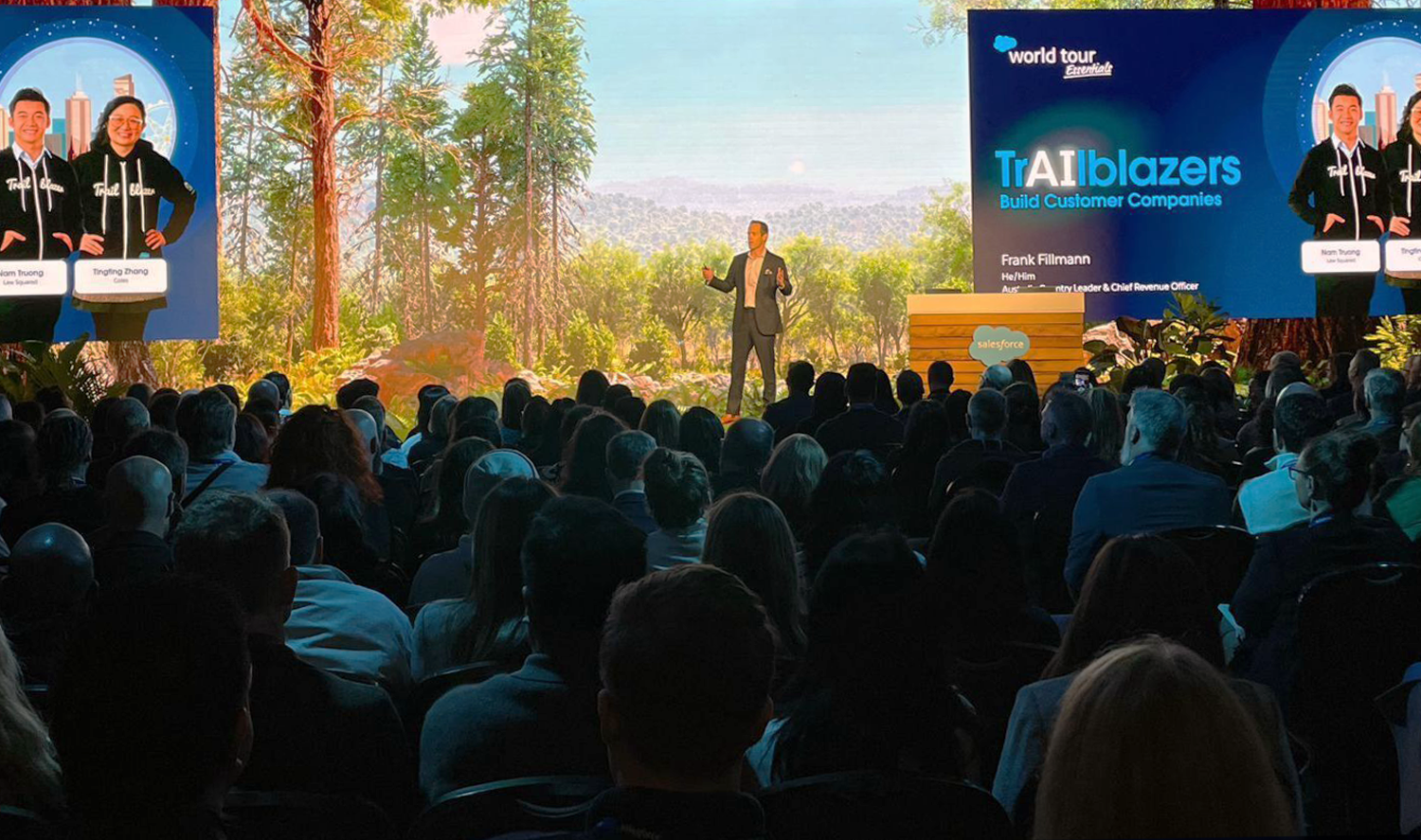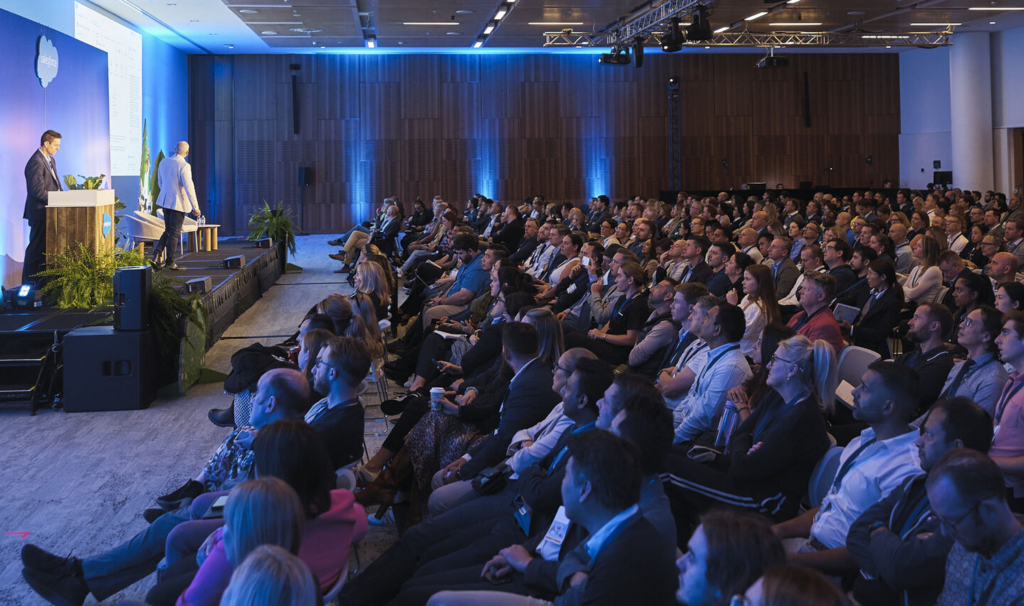World Tour Essentials Melbourne was two packed days of Salesforce presentations, networking and knowledge sharing. Here’s what we learned.
Artificial intelligence + data + CRM. These were the themes of Salesforce’s latest event, World Tour Essentials, held in Melbourne on 9–10 August. We were delighted to attend, and act as Platinum Sponsors for the event.
The keynote address kicked off with a major announcement – Data Cloud and Marketing Cloud will soon be hosted in Australia. This is good news for businesses working in highly regulated sectors where data residency is a priority. Hyperforce is the next-generation Salesforce infrastructure architecture, built for the public cloud. The migration to Hyperforce will commence from January 2024.
Throughout the event, artificial intelligence (AI) was a major focus for many attendees, with much of the talk on the show floor centred on how the rapid advancements in generative AI will change the way we do business.
Trust and artificial intelligence
Artificial intelligence, and its applications for all kinds of business, are evolving faster than we’ve ever seen before. Because of this, every business needs an AI strategy now, says Gayan Benedict, Salesforce Chief Technical Officer and Vice President of Customer Advisory, Australia and New Zealand.
With questions about how data is collected and manipulated by AI systems like ChatGPT, the key message from Salesforce was one of trust. Benedict emphasised that trust is one of the foundational values held at Salesforce, and aims to embody that value in its development of its own AI solutions.
“Your data is not our product,” he said. This message was reinforced when we were introduced to AI Cloud, and the Einstein GPT Trust Layer, which allows you to use your data with any AI model you choose, but still keep your data secure. Salesforce also encourages customers to use the most appropriate large language model (LLM) for their business – that may be your own, one from a third party, or Salesforce’s own domain-specific LLMs.
The key to getting the best from data and AI? A good strategy
The topic of building an AI strategy was high on the agenda at the session titled Strategic Planning for Generative AI Success, led by Salesforce RVP for Customer Transformation Jackie Cook. In it, Mark Tallis, Director, Portfolio Services at Salesforce Professional Services, presented the three elements of a strong AI adoption strategy:
Visualising your AI future
This begins with understanding the business cases for AI that will really unlock value. Is it in augmenting sales processes? Automating marketing? Or improving the performance of your service teams?
Whatever it is, the important point is that you should understand where the value will come from.
Experimenting with the technology
AI will not fit into every facet of your business, so what tests do you need to do to see where it will bring value to your operations? What are the benefits, and what are the trade offs?
Experimentation with your own data allows you to understand the accuracy of the models, the change management implications, and the fit within your existing processes.
Bringing the strategy to life with an AI plan
Once you have your use cases, it’s time to implement. Your plan should include the test results from your experiments, and justifications for bringing the plan to life, including the change implications and levels of efforts required.
Your roadmap should include the features that you want to implement first, but also include a vision for future applications that could be implemented down the line.
These steps, says Tallis, will help you build a strategy that will set your business up for the future, without getting distracted by the rapidly evolving world of AI.
Using data for personalisation
Data was the focus in another breakout session – Create a Data-Led Personalisation Strategy that Drives Business Growth and Elevates Customer Experiences. James Caldwell and Daisy Han from Salesforce led a discussion on the potential for personalisation to drive growth by improving customer experiences.
Caldwell shared two statistics that emphasised the importance of data and personalisation:
- 94% of marketers know their customers expect personalised experiences
- But, only 26% of marketers are confident that their organisation has a successful personalisation strategy in place.
These numbers show that while the desire is there, many organisations do not know how to start with personalisation – and highlight the need for a strong personalisation strategy.
Silvia Ambrose, Senior Digital Product Manager, and David Genziuk, Head of Personalisation and Data at Target Australia, shared how their business identified digital transformation as a way to reverse declining customer numbers. At the heart of this transformation was a digital personalisation strategy.
A key message from Genziuk was the importance of understanding what personalisation means for your business. What do your customers expect? What are the gaps in your business right now, and where do you want to be?
A culture of optimisation, and building an agile mindset at all levels were crucial, he added.
Choosing the right tools that can provide the analysis you need now, but can also scale with your business as it grows, is also important, he said. Most importantly of all, though, is to iterate and experiment – “how do we understand what our customers are doing, bring back the learnings, iterate, adapt, and keep going?”
An example of GPT in action – Service GPT
Jessica Orski, ANZ Service Solution Engineer Leader at Salesforce, kicked off the session titled How to Get Ready for Service GPT.
The reality, she says, is that if you’re not currently using AI, you’re already behind.
Disconnected data, siloed teams, and mundane processes are all cited as barriers to delivering great customer experiences. But according to Orski, they’re also barriers to the effective use of AI systems across your business.
In the context of a contact centre, she added, there are already myriad opportunities for boosting productivity using AI. Instead of asking a service agent to retype the same rote responses again and again, why not use AI to write the responses that are most appropriate for each customer’s concerns? Why not have the same AI record conversations, classify issues, and create knowledge articles automatically?
To answer these questions, Orksi introduced Service GPT – a tool that can handle all of those tasks right now. Customers using Service GPT have already reported a 20% boost in productivity.
Want to know how AI will work for your business?
Infosys Topaz is a set of AI-first services dedicated to helping organisations get the best out of generative artificial intelligence solutions. It can help you accelerate growth, build connected ecosystems and unlock efficiencies at scale. Contact us to find out how it can help your business.
Infosys is a Groundbreaker Sponsor of Dreamforce 2023, taking place in San Francisco on 12–14 September. If you’re heading to the event, make sure to catch Turbocharge Your Transformation Using Gen AI & Infosys Topaz, a presentation from Anjali Yadav, AVP – Unit Client Solution Head at Infosys. We’ll see you there.





